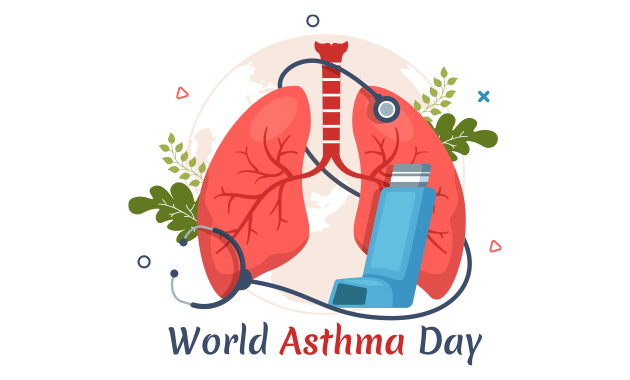
Every breath we take is a reminder of the life-sustaining power of the air, but for people living with asthma, every breath can also be a struggle. Asthma is a chronic lung condition that causes breathing difficulties in individuals to varied degrees. It is caused by swelling and inflammation of the airways, which can occur in response to allergens, exercise, stress, or temperature changes. Shortness of breath, coughing, wheezing, and chest tightness (or pain) are common symptoms of asthma.
While there is no cure for asthma, it is possible to manage the condition effectively and prevent exacerbations with proper care and attention. When asthma is under control, people can lead fairly normal lives, however, specific triggers may need to be avoided. Asthma is managed with preventative medicine for persistent symptoms and relief medication for asthma flare-ups.
To acknowledge the importance of asthma, World Asthma Day is organised by the Global Initiative for Asthma every year on the first Tuesday of May. The aim of this event is to raise awareness about asthma and improve the lives of people living with this chronic respiratory disease. This year’s theme is “Asthma Care for All” with a foucs to implement effective management programs for asthma.
Breathe easier with our wide range of Nebulizers and Vaporizers.
Explore here!
Here are some tips for asthma prevention and management:
1. Pinpoint and Avoid Triggers: One of the best ways to prevent asthma symptoms is to identify and avoid triggers that can make them worse. Common triggers include air pollution, dust mites, cigar or pipe smoke and certain foods[1].
Don’t let asthma hold you back!
Order a lab test today!
2. Implement Asthma Plan: An asthma action plan is a written plan that outlines what to do if you experience symptoms or an asthma attack. It includes information on how to use medication, when to seek medical help, and how to manage symptoms on a day-to-day basis[2].
Get the support you need to medicate properly.
Consult with a doctor now!
3. Medicate as Prescribed: This includes both long-term control and quick-relief medication. Skipping doses or not taking medication properly can lead to worsening symptoms and asthma attacks.
Don’t compromise your health. Choose our reliable asthma medication.
Buy now!
4. Exercise Regularly: Regular exercise can help strengthen your lung capacity and improve overall health[3]. Some people may have asthma episodes during exercise which is known as exercise-induced bronchoconstriction or EIB. Stay physically active with exercises that do not trigger your asthma, such as walking, swimming, or biking.
5. Manage Stress: Stress can trigger asthma symptoms. Stress-management techniques like meditation, yoga, or taking deep breaths can help curb stress[4].
6. Get Vaccinated: Vaccinations, such as the flu and COVID-19, can help prevent respiratory infections that can trigger asthma symptoms or worsen them. Flu vaccination is especially important for people with asthma[5].
Note: COVID-19 is more likely to hospitalize those with moderate-to-severe or uncontrolled asthma[6].
Don’t let COVID-19 disrupt your asthma management plan.
Schedule a COVID-19 test to stay on track.
7. Manage Weight: Being overweight or obese can make it harder to breathe and may worsen asthma symptoms. Losing weight can help enhance lung function and thereby decrease the severity of asthma symptoms.
8. Use a Peak Flow Meter: A peak flow meter is a simple device that measures how well air moves out of your lungs. Using a peak flow meter regularly can help you and your healthcare provider track your asthma and adjust your treatment plan if necessary.
Don’t wait until you have an asthma attack to take action. Buy a peak flow meter to stay ahead of your symptoms.
Shop here!
9. Keep Humidity Levels Low: High humidity can promote the growth of mold and dust mites, which can trigger asthma symptoms. Use a dehumidifier to keep humidity levels below 50%.
10. Create Asthma Friendly Environment: Proper ventilation can help reduce indoor air pollution and promote good indoor air quality. Open windows, use exhaust fans in bathrooms and kitchens and consider adding an air exchange system to your home.
Remember, asthma is a chronic condition that requires ongoing management and care. Learn to recognize and respond to asthma emergencies, and seek medical help promptly.
(The article is written by Dr.Subita Alagh, Senior Executive, and reviewed by Dr. Swati Mishra, Medical Editor)
References
1. American Lung Association https://www.lung.org/lung-health-diseases/lung-disease-lookup/asthma/managing-asthma/reduce-asthma-triggers
2. Available online at https://aafa.org/asthma/asthma-treatment/asthma-treatment-action-plan/
3. American Lung Association https://www.lung.org/lung-health-diseases/lung-disease-lookup/asthma/managing-asthma/asthma-and-exercise
4. Asthma and Allergy Foundation of America https://aafa.org/asthma/asthma-triggers-causes/emotions-stress-depression/
5. People at Higher Risk of Flu Complications
https://www.cdc.gov/flu/highrisk/index.htm
6. CDC https://www.cdc.gov/coronavirus/2019-ncov/need-extra-precautions/asthma.html